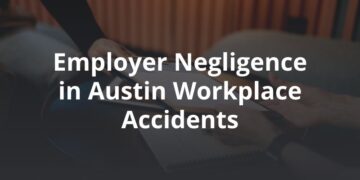Some of the most basic Texas right-of-way laws are so familiar that they seem like common sense. For example, everyone knows that you can only make a right on red if there’s no oncoming traffic.
However, Texas law sets forth right-of-way laws for nearly every traffic situation, even uncommon ones. This means that Texas drivers aren’t always informed of who has the right-of-way, leading to a higher incidence of accidents on Texas roadways.
Knowing the most important right-of-way laws in Texas can save you from ending up in a crash — and it can also protect you from the expensive consequences of violating a Texas right-of-way law.
Pedestrian Right-of-Way Rules in Texas
Texas drivers have a legal responsibility to notice and show care for pedestrians in and around roadways. A pedestrian accident can bring steep consequences and even criminal charges for a driver, even in cases in which a pedestrian didn’t have the right-of-way.
Pedestrians in Texas have the right-of-way in situations that include:
- Crosswalk light indicating pedestrians can walk
- Any green light when there is no pedestrian light
- After the pedestrian light has turned red, if they’ve already begun crossing
- Walking across openings to driveways or alleys
It’s important to note that Texas law considers any four-way intersection to be a crosswalk, regardless of whether lines are painted on the road.
Even when a pedestrian is crossing the road illegally, a Texas driver is still required to yield due to safety concerns. If another vehicle has stopped to let a pedestrian cross, other drivers are required to stop as well.
Intersection Right-of-Way Laws in Texas
Some intersection right-of-ways laws are obvious. Every driver knows to stop at a red light or wait for oncoming traffic to clear before making a left at a green light.
Some intersection right-of-way laws Texas drivers might be less familiar with include:
- Drivers on a paved road have the right-of-way at intersections with an unpaved road
- Drivers entering a road from a driveway or alley must yield to main road traffic
- At uncontrolled intersections, traffic in the intersection has the right-of-way
- The driver to the right has the right-of-way at an uncontrolled intersection
- Pedestrians and other vehicles have the right-of-way at both left and right turns
A high number of avoidable car accidents in Texas are caused by failure to respect the basic laws that determine right-of-way.
Other Situations When You Must Yield the Right-of-Way in Texas
A small handful of vehicles always have the right-of-way on Texas roads.
These include:
- Police cars
- Ambulances
- Fire trucks
- Trains
- School buses
Emergency vehicles always have the right-of-way when their sirens or lights are in use. Other drivers are expected to pull over and allow an emergency vehicle to pass.
One exception involves intersections. Never stop in an intersection, as this can block an emergency vehicle’s access to the crossroad. Instead, finish driving through an intersection before pulling off to the side.
While trains and school buses aren’t emergency vehicles, they’re protected by special laws. Always yield to a train crossing the road. The same is true of a school bus when its lights are flashing.
Texas Right-of-Way Laws Can Impact A Car Accident Claim
Knowing Texas’s right-of-way laws doesn’t just help ensure fewer accidents and greater safety — it can also have a direct impact on the financial outcome of a car accident claim.
A driver who is found responsible for violating a right-of-way law can be found partially responsible for an accident, even if another driver bears a higher level of fault. This can directly impact the ability to recover compensation in a personal injury case.
Taking the time to refresh on Texas right-of-way laws can save you from a serious legal headache someday in the future.
Contact Our Car Accident Law Firm in Austin, TX
If you’ve been injured in an accident in Austin and need legal help, contact our Austin car accident lawyers at FVF Law to schedule a free consultation with our team.
FVF Law
3101 Bee Caves Rd #301, Austin, TX 78746, United States
(512) 982-9328







